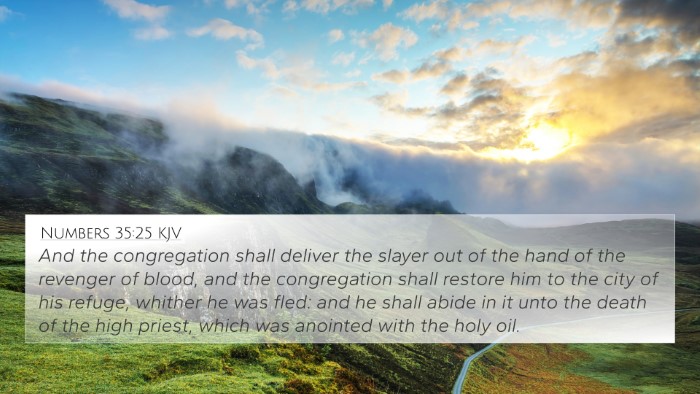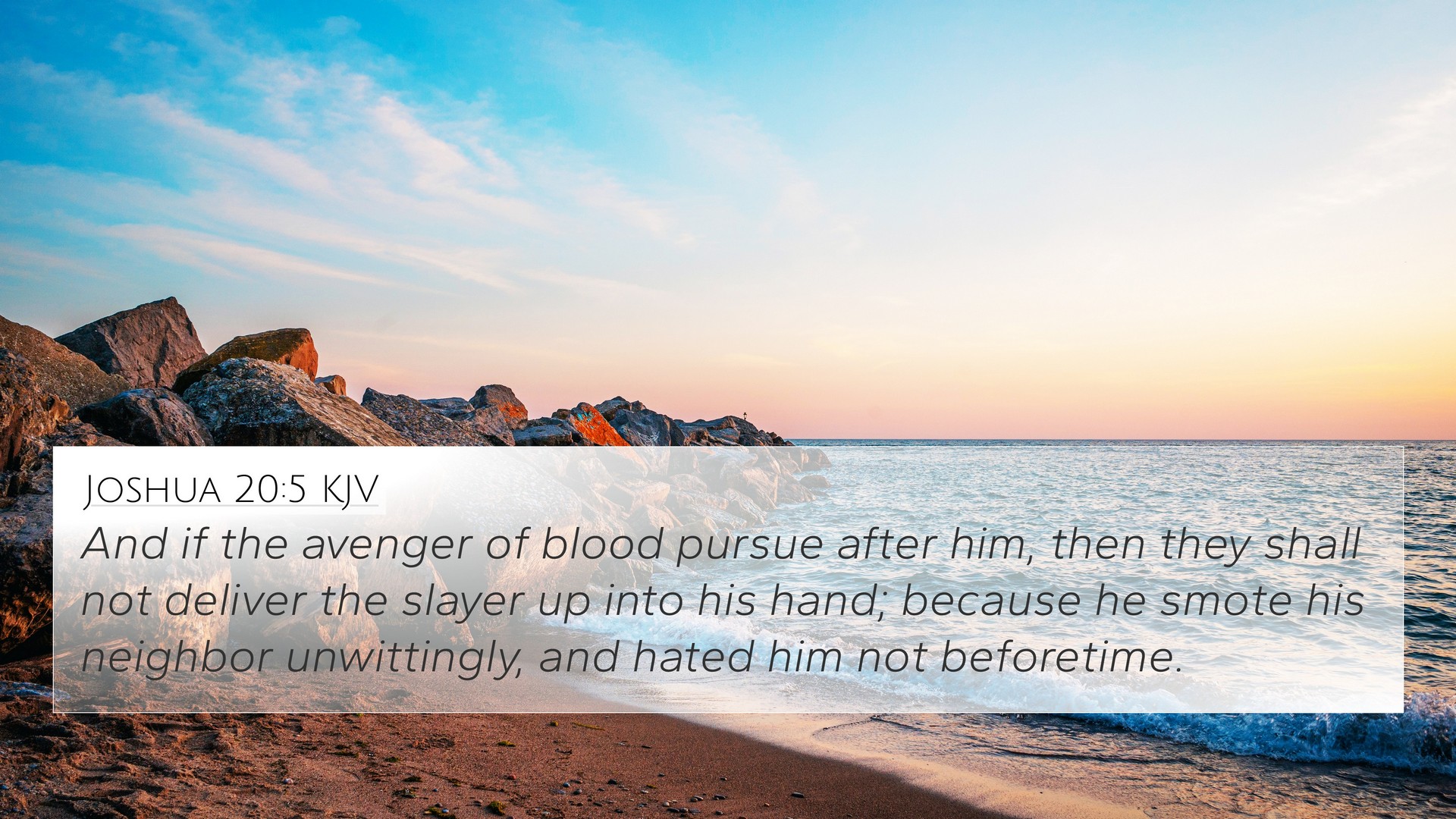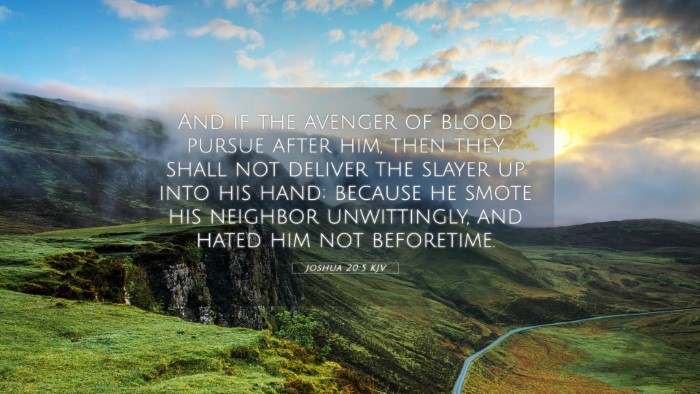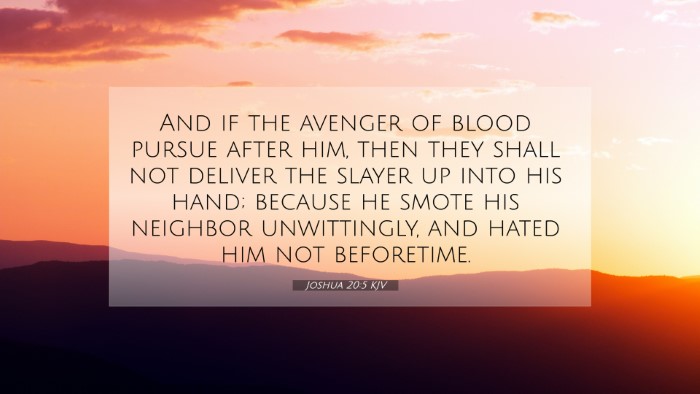Old Testament
Genesis Exodus Leviticus Numbers Deuteronomy Joshua Judges Ruth 1 Samuel 2 Samuel 1 Kings 2 Kings 1 Chronicles 2 Chronicles Ezra Nehemiah Esther Job Psalms Proverbs Ecclesiastes Song of Solomon Isaiah Jeremiah Lamentations Ezekiel Daniel Hosea Joel Amos Obadiah Jonah Micah Nahum Habakkuk Zephaniah Haggai Zechariah MalachiJoshua 20:5 Similar Verses
Joshua 20:5 Cross References
And if the avenger of blood pursue after him, then they shall not deliver the slayer up into his hand; because he smote his neighbor unwittingly, and hated him not beforetime.
Uncover the Rich Themes and Topics of This Bible Verse
Listed below are the Bible themes associated with Joshua 20:5. We invite you to explore each theme to gain deeper insights into the Scriptures.
Joshua 20:5 Cross Reference Verses
This section features a detailed cross-reference designed to enrich your understanding of the Scriptures. Below, you will find carefully selected verses that echo the themes and teachings related to Joshua 20:5 KJV. Click on any image to explore detailed analyses of related Bible verses and uncover deeper theological insights.

Numbers 35:12 (KJV) »
And they shall be unto you cities for refuge from the avenger; that the manslayer die not, until he stand before the congregation in judgment.

Numbers 35:25 (KJV) »
And the congregation shall deliver the slayer out of the hand of the revenger of blood, and the congregation shall restore him to the city of his refuge, whither he was fled: and he shall abide in it unto the death of the high priest, which was anointed with the holy oil.
Joshua 20:5 Verse Analysis and Similar Verses
Understanding Joshua 20:5
Joshua 20:5 states: "And if the avenger of blood pursue after him, then they shall not deliver the slayer up into his hand; because he smote his neighbour unwittingly, and hated him not beforetime."
Summary of Meaning
This verse articulates a provision within the ancient Israelite legal framework concerning cities of refuge. It emphasizes protection for individuals who commit unintentional homicide, establishing a distinction between voluntary and involuntary actions.
Insights from Public Domain Commentaries
-
Matthew Henry's Commentary:
Henry notes the importance of intention in this law. The phrase "smote his neighbour unwittingly" highlights that the act was accidental, not born of malice. This suggests God's justice not only considers the action but also the heart of the actor.
-
Albert Barnes' Notes:
Barnes expands on the implications of the “avenger of blood,” explaining that this term signifies a close relative who seeks to avenge the death of a family member. The city of refuge provides a legal safeguard, preventing blood feuds from escalating based on misunderstandings of culpability.
-
Adam Clarke's Commentary:
Clarke elaborates on the societal implications of these laws, indicating how they aim to discourage vengeance and promote peace within communities. Clarke emphasizes the ethos of mercy inherent in the establishment of sanctuary cities.
Connections to Other Bible Verses
Joshua 20:5 engages with various other scriptures, fostering a rich dialogue across the biblical narrative. Below are several related verses:
- Exodus 21:13 - Discusses unintentional homicide and the role of cities of refuge.
- Numbers 35:11-12 - Outlines the establishment of cities of refuge for the slayer.
- Deuteronomy 19:4-6 - Provides the qualifications for seeking refuge.
- Matthew 5:21-22 - Emphasizes the seriousness of murder and the heart behind actions.
- Hebrews 6:18 - Introduces the concept of refuge in the context of hope.
- Romans 13:4 - Discusses authority and its role in exercising justice.
- Proverbs 28:17 - Reflects on the consequences of shedding blood recklessly.
Thematic Connections
The themes of justice, mercy, and the distinction between intent and action prominently surface in this verse and its related texts. They highlight:
- Divine Justice: The provision for cities of refuge showcases a judicial system grounded in fairness and intention.
- Mercy and Redemption: The refuge offers not just physical safety but also a chance for the offender to seek atonement.
- Community Responsibility: It emphasizes the importance of community support and the legal frameworks necessary to maintain peace.
Cross-Referencing Biblical Texts
Cross-referencing such biblical texts provides deeper insight into the themes found in Joshua 20:5:
- Tools for Bible cross-referencing can provide clarity on the distinctions made within the law.
- A Bible concordance aids users in navigating various verses connected to the act of unintentional killing.
- A Bible cross-reference guide reveals how these laws inform both Old and New Testament teachings.
- Utilizing cross-reference methods can uncover similarities among narratives where mercy is exercised.
Practical Application and Reflection
Contemplating Joshua 20:5, believers are called to reflect on themes of intention versus action in their own lives. This passage offers a place to consider:
- How do we discern the motives behind our actions and those of others?
- What does it mean to offer refuge and support to those in distress?
- How do we navigate conflicts in a spirit of mercy and reconciliation?
Conclusion
In essence, Joshua 20:5 is a foundational text that not only addresses specific legalities within ancient Israel but also fuels essential discussions about justice and mercy that resonate across generations. A thorough understanding of this verse and its related scriptures can foster deeper spiritual reflections and promote compassionate living in accordance with biblical principles.


